 Wisconsin Lawyer
Wisconsin Lawyer
Vol. 83, No. 6, June 2010

I set out a year ago to achieve six goals. Four of them were achievable, and two were aspirational. I did not really think I could end 30 years of lawyer-bashing in one year as your president, nor did I think I could lead the State Bar of Wisconsin to offer all desired member services. These are obviously long-term goals that will never be more than approximated but should be doggedly pursued.
I did get some things done though, or at least I think I did. I am not trying to blow my own horn. Whatever I accomplished, I did so only because of the hard work, prior work, guidance, and dedication of others. I was just lucky that success occurred on my watch. Here is where we are.
I did not think that at the end of one year the State Bar would be a voluntary organization. I did, however, hope that we would be well underway toward that objective. You helped enormously when you elected Jim Boll to follow me. We have accomplished that goal. On May 5, the Board of Governors (BOG) voted (by a 60 percent supermajority) to authorize the preparation of a petition to the Wisconsin Supreme Court requesting that it review the status of the integrated bar and whether it should be made voluntary. There will be companion petitions – perhaps several, seeking permutations of the status quo and hybrids of a mandatory organization with different levels of membership. Nobody can predict how the court will rule, but the issue will be presented soon.
In my inauguration a year ago, I expressed my dismay at the want of financial transparency of the State Bar. A transparency policy, not exactly what I had in mind but 1000 percent better than the status quo, sailed through the Finance Committee with an 8-1 vote. It is a hybrid that essentially splits the difference between the disclosure requirements of Wis. Stat. chapter 19 and the disclosure requirements imposed by the IRS (Form 990) on nonprofit organizations. I would expect that the BOG would adopt this transparency policy, either at its June meeting or the following meeting. Again, this was the work of others – a task force appointed by Finance Committee Chair Nick Zales.
The greatest victory, the victory that has the most profound implications for all of us, has to do with the unauthorized practice of law (UPL). This project was well underway when I took office, and the State Bar UPL Committee pushed it over the finish line (I think) as of June 1. The supreme court is at this moment committed to doing something, and that something is very similar to what the UPL Committee is advocating. I cannot state with certainty what the court will do, of course, but I can tell you with confidence that by the time you read this article there will almost undoubtedly be a clear and sensible definition of what the phrase “practice of law” means, so that the criminal UPL statute (Wis. Stat. section 757.30) can be enforced. I also think that an administrator will be in place to bring injunctive and other remedial actions against unlicensed lay practitioners. I hope that a private cause of action also will exist so that you can sue those quacks who offer legal services to your neighbors or clients without appropriate licensure. (It can be done – the State Bar of Indiana just burned down the “trust mill” I wrote about in the March 2010 Wisconsin Lawyer. And I do mean “burned down” – the miscreants were enjoined from continuing their scheme, disgorged of their gross sales proceeds in that state, and stuck for the bar’s attorney fees! See Indiana State Bar Ass’n v. United Financial, 94S00-0810-MS-551 (Apr. 14, 2010).) Our UPL Committee is to be thanked for this success.
The sixth item was to revamp the rules that govern the State Bar. I have utterly failed in my attempt to reform governance. The failure is partly because I did not have the time to devote to it, partly because I had bigger fish to fry (especially when the UPL opportunity presented itself), and partly because I could see early on that the governors had very diverse views of how the State Bar should work, and that getting a consensus would be difficult. The issue may be changed dramatically by the decision(s) the court makes about SCR chapter 10 and the mandatory bar.
Serving as your president has been a humbling experience. Also vexing, exhausting, expensive, thrilling, frustrating, enjoyable, infuriating, and instructive. I appreciate the opportunity and the experience more than I can express.
I want to thank the justices of the Wisconsin Supreme Court for their willingness to extend collegiality and genuine friendliness to State Bar leadership. Each and every one was cordial and approachable. We seldom think of the justices as the fellow lawyers they are willing to be when the State Bar comes knocking.
A big “thanks” is owed to the staff as well, particularly (but not only) Lynda Tanner and George Brown. What can I say? Without the staff to do the heavy lifting, we volunteers could achieve nothing.
On July 1, I pass the baton to Jim Boll. If I had handpicked my successor I could not be happier with the choice. Jim joined me for a score of informal chats with the members of the supreme court (a practice I strongly recommend for all future State Bar presidents). Jim has a better grip on the ins and outs of the State Bar than anyone else I know. I did everything I could during my year as president to include Jim in all executive functions, appointing him to all critical boards and committees. In return I enjoyed his wit, wisdom, guidance, and more than a little patience. He will hit the ground running. He will serve us all proud.
Wisconsin Lawyer
